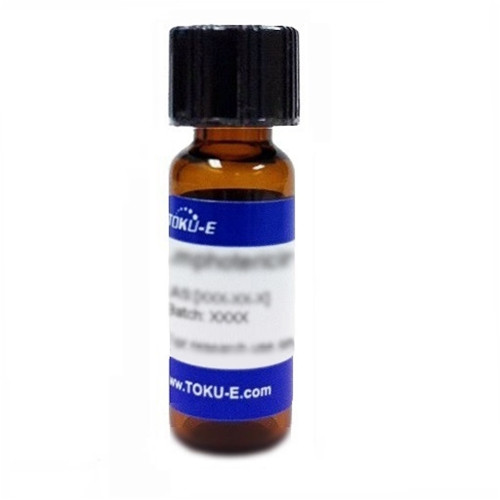Everolimus is a macrocyclic lactone prepared from Rapamycin. It is an analog of Tacrolimus, and binds to receptor protein FKBP12. It is the most commonly used mTOR inhibitor. Everolimus has been found to have anti-cancer properties, and it can also be used as an immunosuppressive agent.
Everolimus is soluble in ethanol, methanol, DMF and DMSO.
| Mechanism of Action | Everolimus binds to receptor protein, Peptidyl-prolyl cis-trans isomerase (FKBP12). The complex then binds to ‘mammalian target of rapamycin’ (mTOR) thus preventing it from interacting with target proteins, inhibiting its downstream signaling. It is more selective for the mTORC1 protein complex compared to the mTOR2, the two complexes that make up the mTOR protein. |
| Cancer Applications | Everolimus was reviewed in breast cancer cell lines (MCF-7, MDA-MB-231 and T47D ) in combination with Metformin for cytotoxicity and cell survival in vitro. The combination resulted in an inhibition of cell survival, clonogenicity, mTOR signaling and mitochondrial respiration. The effects were evident in both high and low glucose conditions (Ariaans et al, 2017). Everolimus was evaluated with metformin alone and in combination with chemotherapeutic drugs (carboplatin, paclitaxel and doxorubicin) on human breast cancer cell lines. There was a synergistic inhibition of cell proliferation when Everolimus and Metformin were combined with chemotherapeutic agents (Liu H et al, 2012). Whole-genome sequencing was used to investigate remission of metastatic bladder cancer after treatment with Everolimus. Among the somatic mutations was a loss-of-function mutation in tuberous sclerosis complex 1 (TSC1), a regulator of mTOR pathway activation (Iyer et al, 2012). Medullary thyroid cancer (MTC) is a neuroendocrine tumor originating from the C cells within the thyroid gland. This type of cancer may be an optimal model to evaluate the efficacy of Everolimus for the following reasons: 1) the tumor expresses the molecular pathway targeted by the compound; 2) there are currently no chemotherapeutic compounds available for MTC; 3) calcitonin and carcinoembryonic antigens are markers of MTC progression and can help to evaluate the response to Everolimus and 4) in vitro study showed an inhibitory effect on cell proliferation of MTC cells. Authors studied the in vitro effects of Everolimus on MTC cell lines (TT and MZ-CRC-1). The compound induced a significant dose-dependent inhibition in cell proliferation. This seems to be a cell cycle arrest in G0/G1 phase (Faggiano A et al 2011). |
| References | Ariaans G, Jalving M, Vries EG and Jong S (2017) Anti-tumor effects of everolimus and metformin are complementary and glucose-dependent in breast cancer cells. 17(1):232 PMID 28356082 Faggiano A et al (2011) Everolimus is an active agent in medullary thyroid cancer: A clinial and in vitro study. J. Cell. Molec. Med. 16(7):1563-1572 Hatanaka H. et al (1988) FR-900520 and FR-900523, novel immunosuppressants isolated from a Streptomyces. II. Fermentation, isolation and physico-chemical and biological characteristics. J. Antibiot. 41:1592 Morisaki M. & Arai T (1992) Identity of immunosupressant FR-900520 with ascomycin. J. Antibiot. 45:126 |


